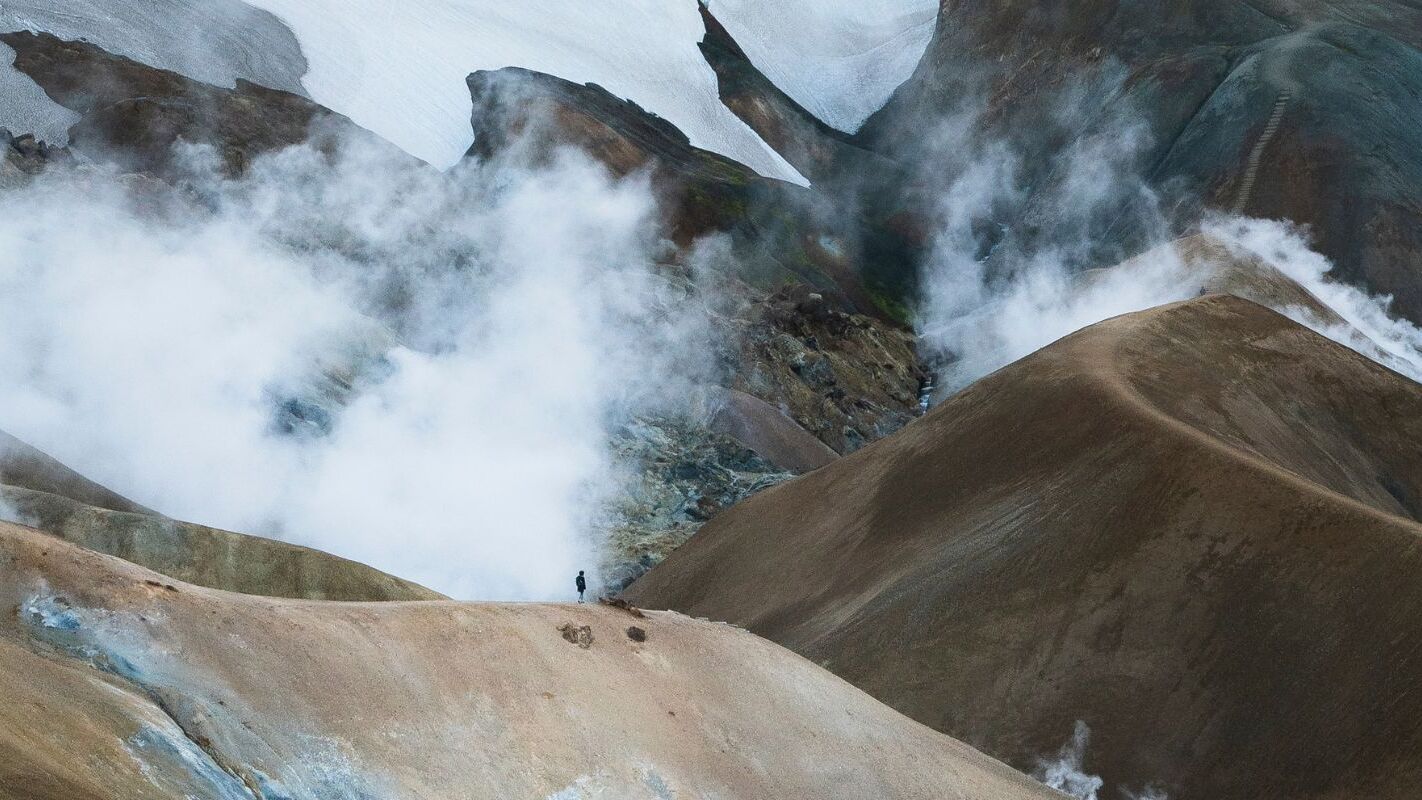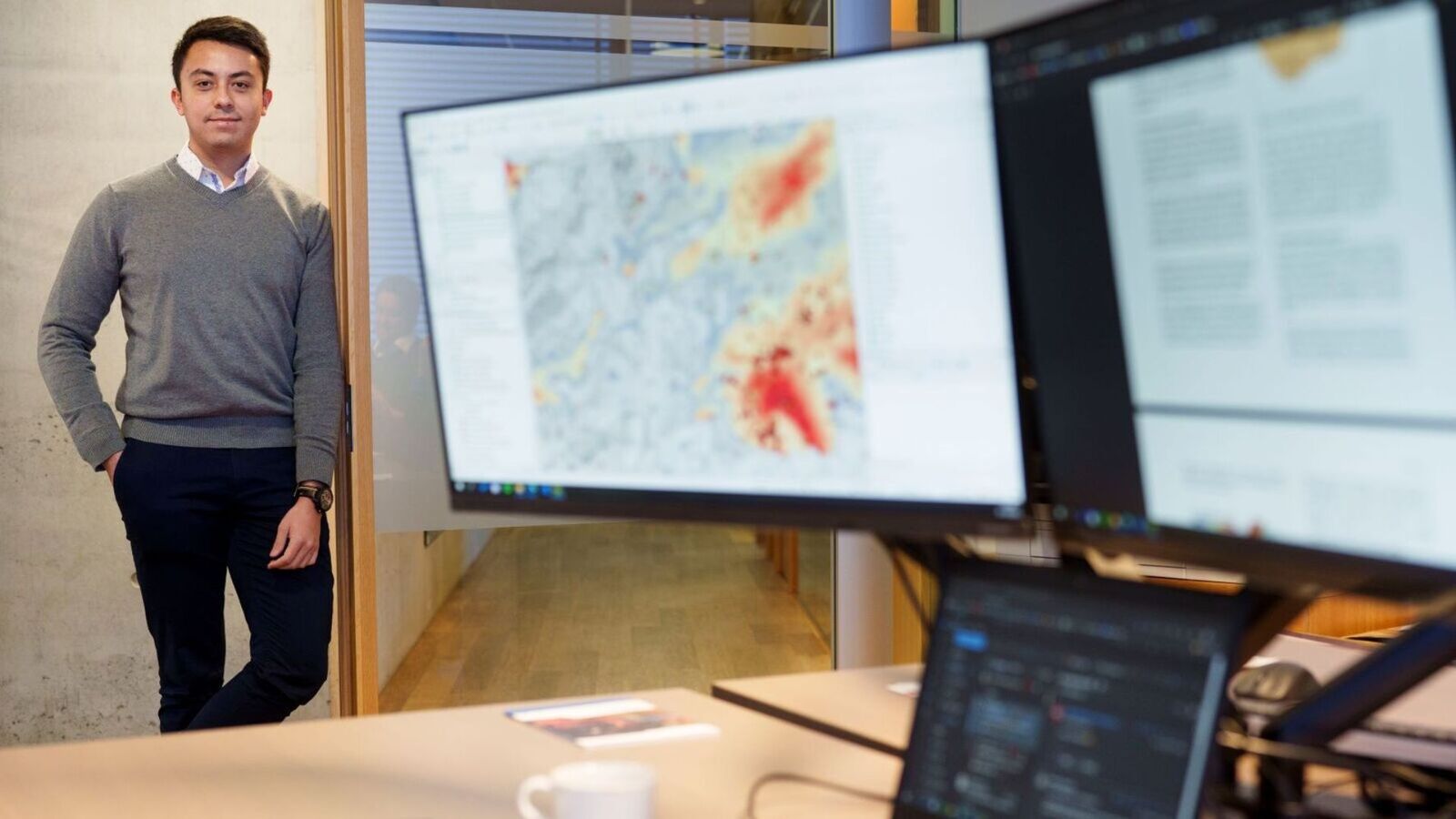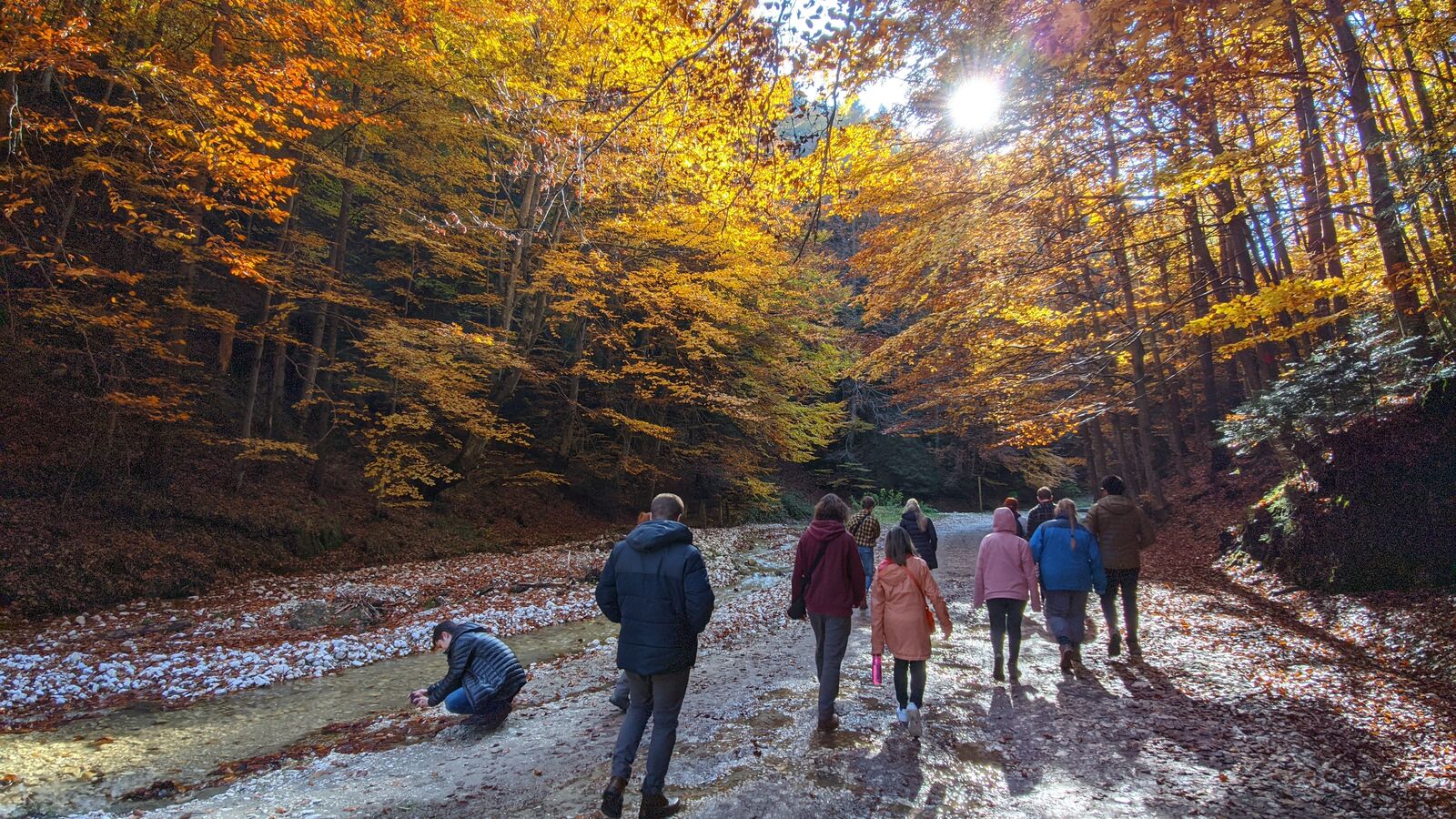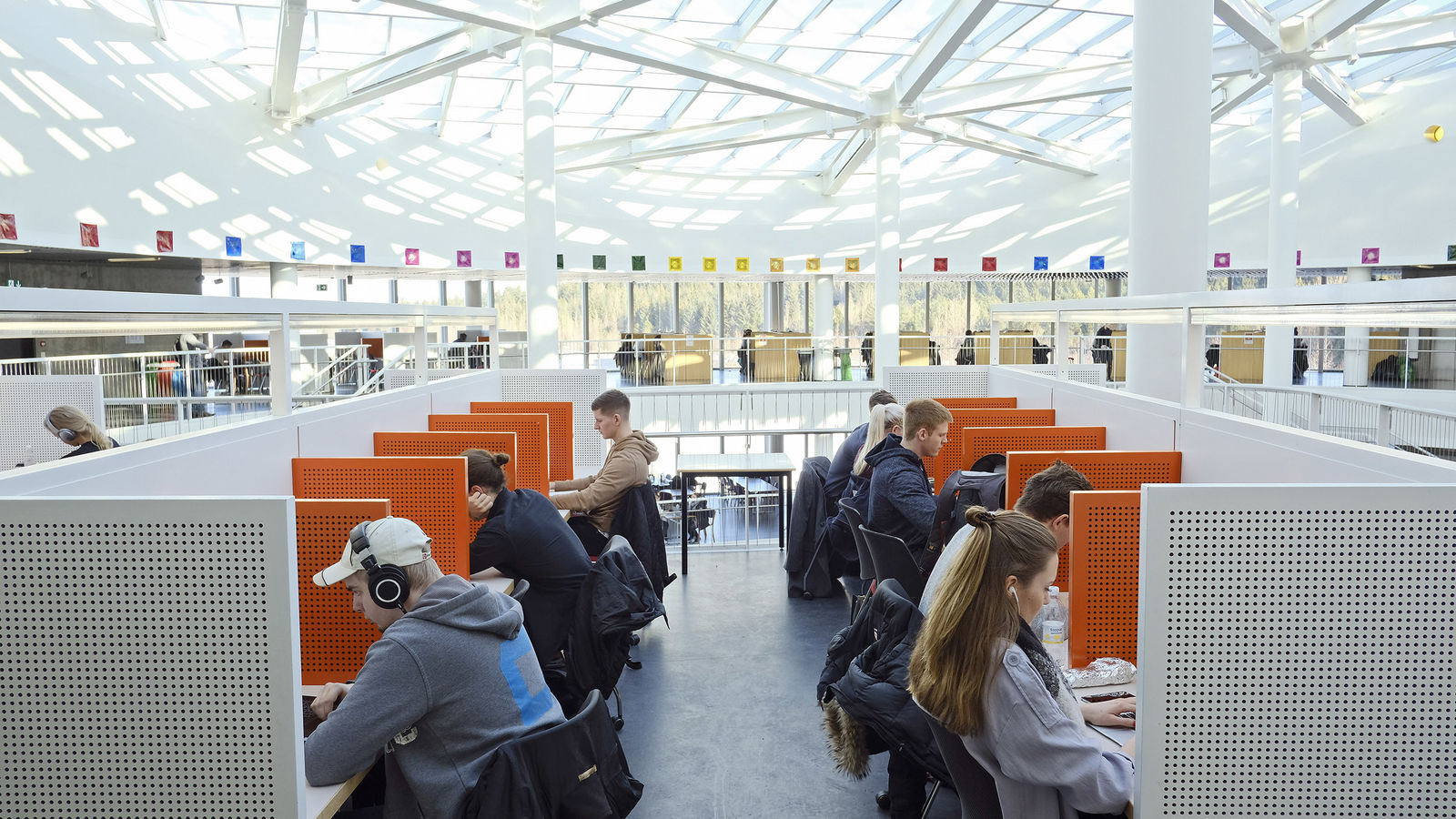Dual Degree: MSc Sustainable Energy & MSc Earth Sciences
The dual degree program between Reykjavik University and INRS, Canada, focuses on earth and geosciences, particularly geothermal energy. This 24-month program integrates economics, technology, and engineering science, emphasizing practical experience and research. Students spend their first year at Reykjavik University and the second at INRS, culminating in a comprehensive education for careers in sustainable energy and earth sciences.
Overview

Language of Instruction: English
Start Date: late July / early August
At Reykjavik University, we are proud to present our innovative dual degree Master's program in Earth Sciences, emphasizing renewable energy. This program is a collaborative effort between Reykjavik University in Iceland and INRS in Canada, blending the unique strengths and expertise of both institutions.
In Iceland, we harness the power of geothermal energy for both electricity generation and heating. Our geothermal resources, owing to Iceland's distinct geology, are easily accessible and provide a significant portion of our energy needs. Meanwhile, in Quebec, Canada, expertise has been developed in the use of geothermal heat pumps for efficient heating and cooling of buildings. This program explores the potential of evolving these technologies further, particularly in enabling Quebec to tap into its geothermal resources. Such advancements could be instrumental in providing cleaner energy alternatives for communities currently reliant on fossil fuel-based thermal power plants, enhancing energy security and reducing dependency on non-renewable resources.
The Master's program in Earth Sciences, with a two-degree track in renewable energy, is designed to provide students with specialized skills in geology and geological engineering. It integrates the master's degree in Earth Sciences from INRS, Canada, with the master's degree in Renewable Energy from the University of Reykjavik, Iceland. Enrolled students benefit from the unique opportunity of having their research projects co-directed by expert teams from both Iceland and Canada.
Participants will spend an equivalent of one year at each partner institution. Upon successful completion of the program, graduates will receive a diploma from both Reykjavik University and INRS, reflecting their comprehensive, international education in renewable energy. The program also includes a research project, focusing on subjects jointly proposed by our teams in Iceland and Canada, providing students with an invaluable international experience and a broad perspective in the field of renewable energy research.
Collaboration – Inside Access
In collaboration with our partners, including global leaders in renewable energy like Reykjavik Energy and Iceland Geosurvey, students are offered unparalleled insights into the entire sustainable energy spectrum. From witnessing the power of geothermal power plants to understanding the intricacies of sustainable energy laws, the journey is comprehensive and enlightening.
Student Body and Faculty
The Sustainable Energy Science program attracts a diverse cohort of students with backgrounds spanning from business and engineering to social sciences and natural sciences. While students from disciplines such as Business, Engineering, Economics, Geology, and Geography often find the curriculum incredibly enriching, our doors are open to passionate learners from all academic realms.
These rich backgrounds foster a unique interdisciplinary environment, enriched further by our faculty — a blend of seasoned academics and industry professionals. Together, they ensure a holistic and practical understanding of sustainable energy challenges.
Addressing Global Energy Challenges
The program will equip students to apply sustainable energy concepts and quantitative methods to real-world challenges. Students will gain insights into the significance of a holistic approach, understanding the interplay between technology, economics, and policy-making. Moreover, with the looming challenge of climate change, the principles and tools of sustainable energy are indispensable in crafting global solutions.
Join us in this journey as we explore the vast discipline of sustainable energy, delve into its complexities, and emerge with knowledge and skills that not only promise a sustainable future but also pave the way for innovative solutions in the energy field.
Program Structure

Duration and Format
- Duration: 24 months of continuous study.
- Format: Full-time, on-campus.
- Credits: 120 ECTS
Core Courses:
- Energy Economics (6 ECTS): This foundational course, integral to our energy policy and economics pathway, delves into the nuances of energy demand and supply, pricing mechanisms, environmental implications, and the ever-changing world of public policies. Through hands-on exercises, in-depth analyses, and expert-led discussions, gain insights into global oil and gas markets, power sector monopolies, and sustainable energy solutions. Energy Economics is designed to empower students with the knowledge to navigate the complexities of the energy sector.
- Energy Technology (6 ECTS): This course provides a comprehensive understanding of how energy flows through various systems, from natural phenomena like glaciers to man-made structures such as electric motors. You'll explore the techniques and technologies humans have developed to harness this energy and the implications these have on our economy and environment. This course provides a solid grasp of the fundamental principles of energy and its associated technologies which are crucial for those looking to engage in energy policy discussions, evaluate energy projects, or understand the broader impact of human activities on energy systems.
- Data Mining and Machine Learning (8 ECTS): This course provides a comprehensive exploration of pattern recognition, classifier design, and statistical pattern recognition, encompassing topics from Bayesian decision theory to neural networks and advanced techniques. Through hands-on experience with tools like Python, students will apply these concepts to diverse challenges. While the curriculum is broad, the acquired skills find practical applications in the energy sector. These skills are particularly valuable for tasks such as energy data analysis, system optimization, trend forecasting, and identifying patterns for informed decision-making within the dynamic energy landscape.
Teaching and Learning
Our curriculum is a blend of traditional lectures, seminars, and field visits, ensuring a comprehensive understanding of the subject matter here at Reykjavik University. What truly sets us apart is our faculty, comprising both accomplished academics and industry experts, bringing a wealth of knowledge and real-world insights to the classroom.
Personal Study Plan
The Iceland School of Energy champions a collaborative and interdisciplinary approach to energy challenges. We tailor study plans to each student's strengths and interests, ensuring engagement and intellectual growth. Core courses, indicated with (*), are integral to the curriculum.
Our program spans two years, with the first year at Iceland School of Energy and the second at INRS, culminating in graduation in the fall of the third year, with no extra fees for the extended study period. Unique to our program, students engage in concurrent research courses across both universities, allowing seamless integration of diverse expertise and resources. This approach guarantees a comprehensive education in sustainable energy, uniquely suited to the demands of our evolving world.
Sample Schedule - Science
| Summer | Fall | Spring | |
|---|---|---|---|
| Year 1 | 6 ECTS
| 24 ECTS RU Courses
| 30 ECTS RU Courses
|
| Year 2 | 21 ECTS INRS Courses
| 21 ECTS INRS Courses
| |
| Year 3 | 18 ECTS
|
Sample Schedule - Engineering
| Summer | Fall | Spring | |
|---|---|---|---|
| Year 1 | 6 ECTS
| 24 ECTS RU Courses
| 30 ECTS RU Courses
|
| Year 2 | 21 ECTS INRS Courses
| 21 ECTS INRS Courses
| |
| Year 3 | 18 ECTS
|
Core Courses and Electives
This three-week course provides a comprehensive introduction to sustainable technology. Through a combination of lectures and site visits, students gain insights into the factors driving the demand for sustainable energy and the practicalities of implementing these technologies. With guidance from our experienced faculty, you'll have the opportunity to see sustainable energy systems in action and understand their real-world applications.
Over 12 weeks, students delve into the specifics of energy economics. The course covers a range of theoretical and empirical topics, equipping students with the skills to analyze energy systems, evaluate energy projects, and develop solutions to practical problems.
Energy and Climate Policy Innovation
This course offers insights into energy and climate policy development and its real-world implementation. It covers the policy-making process, its implications for climate change, and the pressing energy needs of our times. Students will also practice policy advocacy, negotiation, briefing delivery, and op-ed writing.
Environmental Impact Assessment
In this three-week course, students learn about the Environmental Impact Assessment (EIA) process. They'll understand how to gauge the environmental effects of proposed developments and have the chance to craft their own EIA on a chosen topic.
Energy Markets and Regulations
This course, in collaboration with Cornell University, provides an overview of energy markets and regulations. It focuses on the industries in North America, especially the United States and Canada, with an emphasis on electricity pricing and market oversight. The course also touches upon the role of liquid and gas fuel markets.
This 12-week course offers a foundational understanding of energy technology and engineering. Tailored for those new to the field, it covers essential concepts like thermodynamics, fluid mechanics, and heat transfer, ensuring students can competently describe various energy systems.
This course offers insights into the geoscience principles that underpin the energy sector. Topics covered include geology basics, the relationship between rocks and energy, structural geology fundamentals, and geomechanics. Practical sessions focus on interpreting geological maps, creating geological cross-sections, and understanding the dynamics within geological energy systems.
Geothermal Conceptual Modeling
This course introduces students to geological modeling and geothermal conceptual designs. It emphasizes hands-on learning, where students will work with the Leapfrog Geothermal software and delve into the conceptual modeling processes. The course concludes with students developing natural state models using both simulated and real field data.
Gain a clear understanding of the legal and institutional frameworks in the field of international and European energy law. This course covers the primary legal principles, policy matters, and legal issues related to energy and sustainable development. It also offers insights into the Icelandic energy market and the relationship between national and international energy laws.
Get a comprehensive understanding of power project design, construction, and operations. This course covers geothermal plant cycles, equipment, and operations. Students will learn to structure feasibility studies, design piping and pumping stations, understand major design point selection processes, and develop major conceptual drawings.
This course emphasizes the importance of robust research skills. Students will be guided through literature surveys, scientific writing techniques, and research project management, ensuring they're well-prepared for academic endeavors in subsequent courses.
>> More information on all available courses can be obtained from the course overview page.
Study Abroad & Exchange

Students from the Iceland School of Energy during their exchange program at the University of Bucharest, exploring the Romanian mountains, the source of water channels for hydropower generation.
At the Iceland School of Energy, we believe in the power of global perspectives. That's why we've established partnerships with renowned universities across Europe and beyond, enabling our students to embark on programs ranging from a few days to a semester or two.
Typically, students opt for these exchange opportunities in their second year or later. This timing allows them to align their overseas studies with their thesis research, delving deeper into specialized topics and benefiting from the expertise available at our partner institutions.
For many of our students, who hail from various corners of the world, these program offers an enriching chance to diversify their academic journey. Our partner institutions are spread across countries including Austria, France, Germany, Italy, Slovenia, the Netherlands, Romania, Colombia, Mexico, and Indonesia, offering a myriad of learning environments and cultural experiences.
Benefits of our exchange programs include:
- Gaining a broader understanding of the global energy landscape.
- Immersing in diverse teaching methodologies and cultural nuances.
- Collaborative opportunities, such as co-authoring thesis topics with faculty from partner universities.
- Specializing further in specific areas of interest, enhancing employability and industry readiness.
In essence, our exchange programs are more than just academic adventures; they're pathways to global understanding, fostering well-rounded professionals ready to make impactful contributions in the energy sector.
Admission
Admission Requirements
The Sustainable Energy dual-degree program, a collaborative initiative with INRS, invites applications from students across a wide array of academic disciplines, including engineering. This program is particularly suited for those who are keen on contributing to the field of sustainable energy through an interdisciplinary approach.
Beneficial Undergraduate Degrees
While we welcome a diverse range of academic backgrounds, the following undergraduate degrees are especially beneficial:
- Earth Sciences, Geology, Geological Engineering, relate engineering field, or another related field.
For further details regarding admission requirements and the application process, please visit our Admissions page for the Iceland School of Energy at: Admissions Page
Recommend GPA
The recommended grade point average (GPA) for admission is 8 out of 10 on the Icelandic selected grade point scale, which is equivalent to a GPA of 3.25 out of 4 on the U.S. scale.
Application Process
Candidates must apply for admission at both INRS and Reykjavik University.
INRS Admission Requirements for the Master's in Earth Sciences (dual-degree program in sustainable energy):
- Bachelor's degree or equivalent in Earth Sciences, Geology, Geological Engineering, or a related field.
- Cumulative GPA of at least 3.0 (out of 4.3) or equivalent.
- Proficiency in French and English.
- Positive recommendations from referees.
- Agreement by a professor from each partner institution to supervise the student's thesis.
- Offer of admission from Reykjavik University.
To graduate with a master's degree in engineering and become a chartered engineer in Iceland, students must fulfil requirements set forth by the Ministry of Industries and Innovation. See here for more information.
Tuition
Students pay tuition and other fees to their home institution during the exchange period. More information about tuition and fees for Reykjavik University can be found here: Tuition Fees
Contact us
Have a question about the dual degree programme between Reykjavík University and Aalto University? Reach out to us and lets discuss the possibilities.
Reykjavik University
Juliet Newson
Professor Responsible
Jacob Kaminski
Program Administraor
Freyja Ingadóttir
International Coordinator
INRS
| Name | Title | Contact | Description |
|---|---|---|---|
| Renaud Soucy La Roche | Professor Responsible | renaud.soucy_la_roche@inrs.ca | Contact for questions regarding the content, structure of the graduate programme, and other inquires about it. |
| Admissions | registrariat.sesre@inrs.ca | Contact for general questions regarding the application process, visa-related issues and inquires. |

